

Drought concerns in Brazil; Argentina farms too wet to plant. Soycomplex Nov 12 Soybeans closed at USD15.58 1/2, up 11 1/2 cents; Jan 13 Soybeans closed at USD15.60, up 11 1/4 cents; Dec 12 Soybean Meal closed at USD484.3, up USD2.10, Dec 12 Soybean Oil closed at 50.43, up 27 points.
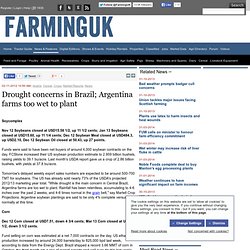
Funds were said to have been net buyers of around 4,000 soybean contracts on the day. FCStone increased their US soybean production estimate to 2.959 billion bushels, raising yields to 39.1 bu/acre. Last month's USDA report gave us a crop of 2.86 billion bushels, with yields at 37.8 bu/acre. Corn. Bad weather prompting more British farmers to consider GM use. The extreme weather of 2012 has turned British farmers on to genetically modified crops, with calls from farming leaders to start using the technology as a way to help combat the effects of climate change.
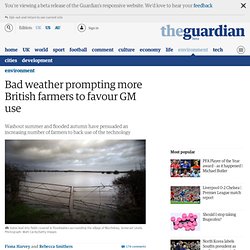
England's wettest year on record, and the UK's second wettest, which had begun with one of the worst droughts for decades, has persuaded an increasing number of farmers that the development of crop varieties with engineered resistance to extreme weather conditions is now a priority. Farming groups are in favour of the move, and many individual farmers now want to explore the use of the controversial techniques, according to delegates at the Oxford Farming Conference. "If the UK is sets itself outside the global market [in which many countries are pursuing GM crops] then we would become fossilised into an old-fashioned way of farming," Peter Kendall, president of the National Farmers' Union, told the Guardian. Get used to 'extreme' weather, it's the new normal.
School children encounter flood water after heavy rains in Jhabua, central India.
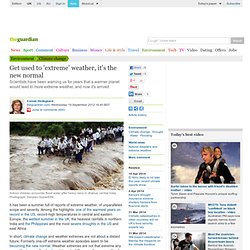
Photograph: Sanjeev Gupta/EPA It has been a summer full of reports of extreme weather, of unparalleled scope and severity. Among the highlights: one of the warmest years on record in the US, record-high temperatures in central and eastern Europe, the wettest summer in the UK, the heaviest rainfalls in northern India and the Philippines and the most severe droughts in the US and east Africa. In short, climate change and weather extremes are not about a distant future.
Formerly one-off extreme weather episodes seem to be becoming the new normal. And this should not come as a surprise. And although not every extreme weather event can be attributed to climate change, scientists are now much more confident about linking individual weather events to climate change. Waterproofing Crops: Effective Flooding Survival Strategies.
© 2012 American Society of Plant Biologists. All Rights Reserved. Julia Bailey-Serres*, Seung Cho Lee and Erin Brinton + Author Affiliations ↵*Corresponding author; e-mail serres@ucr.edu. Plant Physiology December 2012 vol. 160 no. 4 1698-1709 Extremes in water availability (droughts and floods) have increased in frequency and intensity over the past 50 years in farming regions throughout the world. Figure 1. Financial losses in crop production due to environmental stresses in the United States from 2000 to 2011. Wet Weather Requires Slurry Spreading Period Lengthened. News Wet Weather Requires Slurry Spreading Period Lengthened 14 November 2012 UK - The NFU's Environment Team has released their monthly newsletter. Flood management and slurry spreading are some of the key issues discussed with the wet autumnal weather causing problems.
Exceptional rainfall has caused many farmers difficulty regarding spreading sufficient slurry to empty their stores prior to the closed periods. Defra has extended the slurry spreading 'window' by 4 weeks on soil types other than sandy or shallow, but continued rainfall and waterlogged conditions over this period, together with the late stage of the season, makes it likely that there will be chronic slurry spreading issues for much of the winter period. NFU Mutual faces £20m flooding bill - 11/28. Rural insurer NFU Mutual is facing a £20m bill to cover the cost of flooding, with parts of the country braced for more heavy rain today (27 November).
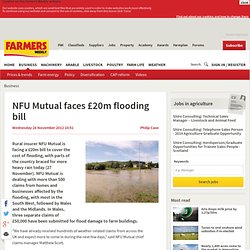
NFU Mutual is dealing with more than 500 claims from homes and businesses affected by the flooding, with most in the South West, followed by Wales and the Midlands. In Wales, three separate claims of £50,000 have been submitted for flood damage to farm buildings. "We have already received hundreds of weather-related claims from across the UK and expect more to come in during the next few days," said NFU Mutual chief claims manager Matthew Scott. "Although it's too early to put an accurate figure on the cost of claims, we could be looking at a total bill of up to £20m for NFU Mutual alone.
" In addition to flooded farms, many rural businesses such as hotels, shops, offices and workshops have also suffered extensive damage, the insurer said. Vehicles have been hard hit, with claims for flooded cars, tractors and harvesting vehicles reported. Farmers count cost of wet weather - 11/26. Farmers are counting the cost of the wet weather after yet more heavy rain brought autumn drilling and cultivations to a standstill.
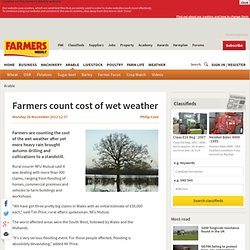
Rural insurer NFU Mutual said it was dealing with more than 300 claims, ranging from flooding of homes, commercial premises and vehicles to farm buildings and workshops.